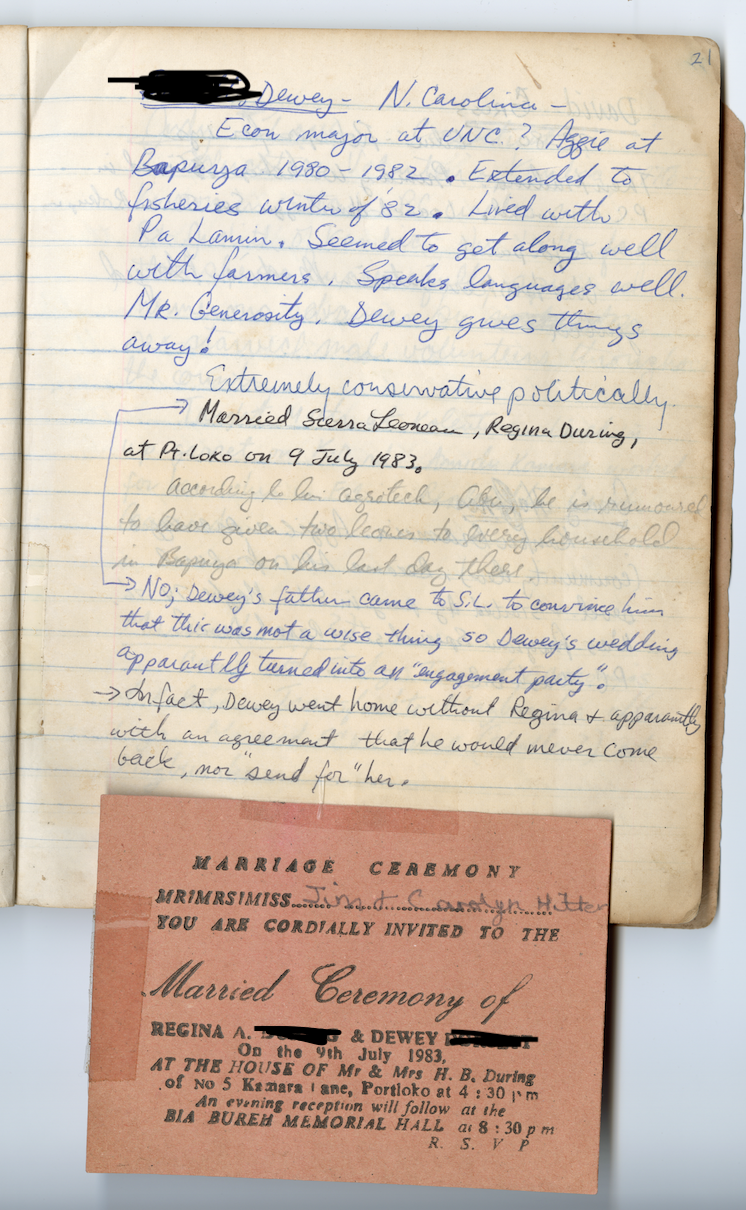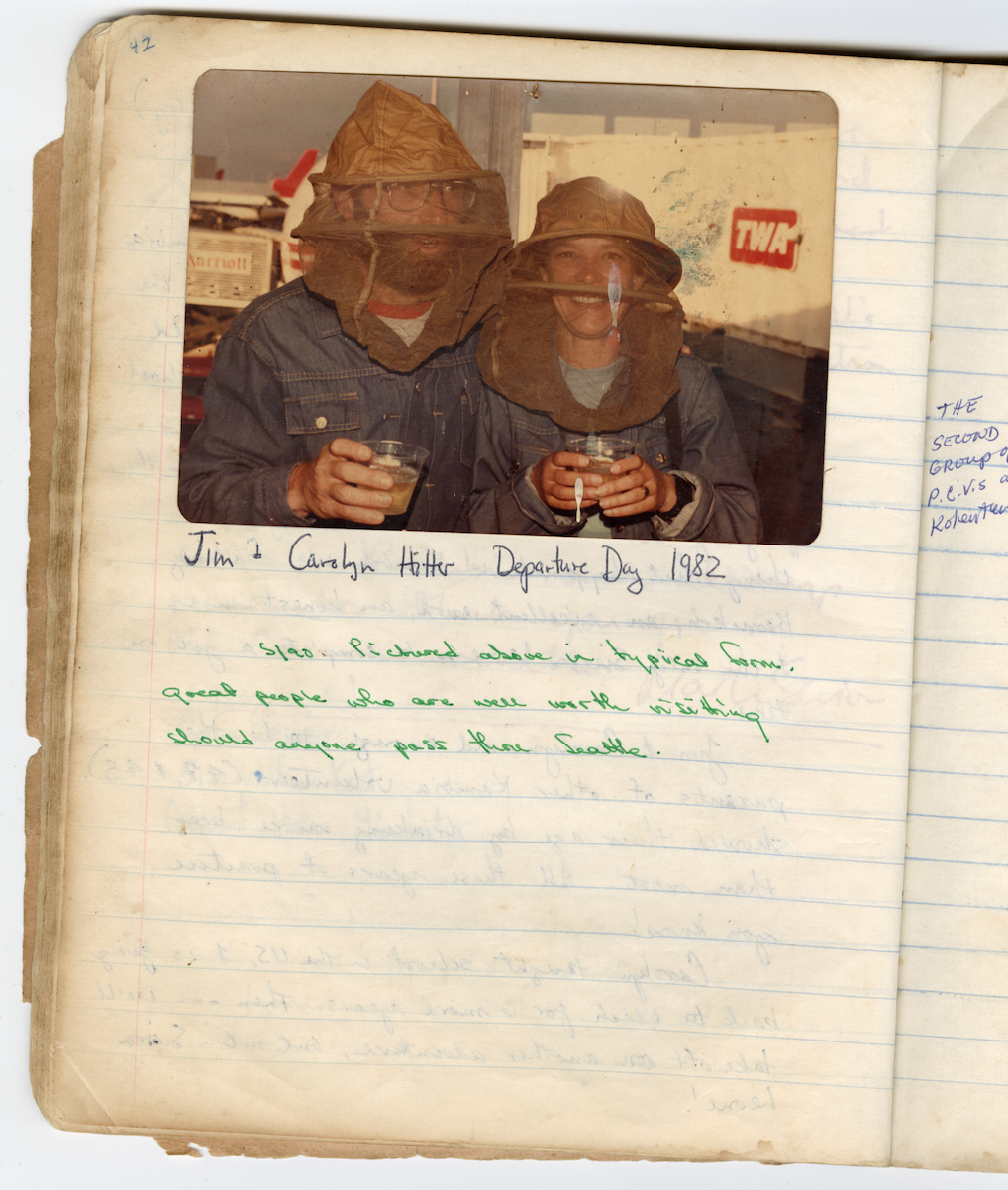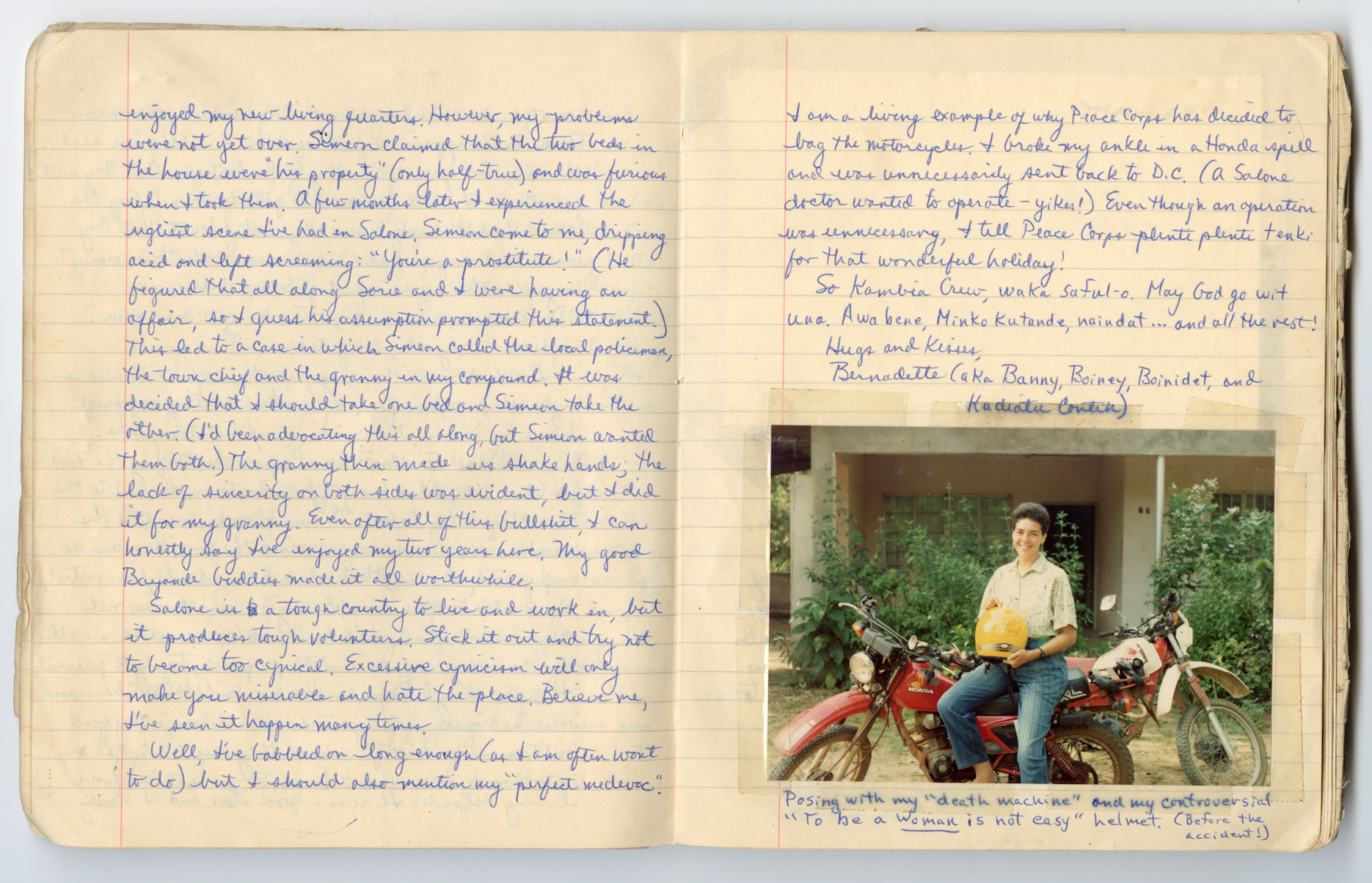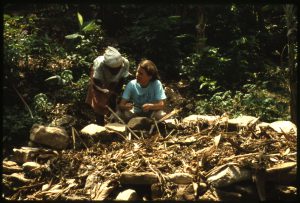In 1983, Jim and Carolyn Hitter left a notebook in the Peace Corps Rest House in Kambia, Sierra Leone, as a way to remember the work of their fellow volunteers. Scrawled on the inside cover of the faded notebook: “Dedicated to us, the PCV’s, VSO’s of Kambia. Twenty years of Volunteers have been here and left no record, no footprints…With this small beginning maybe our successors will know us by our deeds and misdeeds.”
Once the first journal filled, other PCVs added another in 1988. Many of the entries are a bit of gossip, others are firsthand reflections and memories of their time in Sierra Leone.
Here are some entries from the two notebooks:
Dewey- N. Carolina
Econ major at UNC? Aggie [Agriculture] at Bapinga 1980-1982. Extended to fisheries winter of ’82. Lived with Pa Laurin. Seemed to get along well with farmers. Speak languages well. Mr. Generosity. Dewey gives things away!
Extremely conservative politically.
Married Sierra Leonean, Regina Durwig, at Pt. Loko on 9 July 1983.
No; Dewey’s father came to S.L. to convince him that this was not a wise thing so Dewey’s wedding apparently turned into an “engagement party.”
In fact, Dewey went home without Regina and apparently with an agreement that he would never come back, nor send for her.
Page from Jim Hitter’s Notebook, Jim Hitter Collection, Peace Corps Community Archives.
Logan 72-74
History at Kolenten. Had a masters in World History and a BA in African History. (Orland was in his Form III Class). There was a riot at school because all the history students were getting poor grades. “Logan must go or die” was chalked on the streets. According to Orlando, “he resembled Jesus and he never laughed.
Jim Hitter, 1982-1984 Kambia
…”Lived” (in a matter of speaking) through 2-3 extensive beer droughts. Saw the price of STAR [beer] go from $.80 to $4.00.…Never taught before this experience and never will again. In fact I expect never to work again. My background for this was some years as an engineer in the aerospace industry, VISTA (in a veterans project in Seattle) and 10 years retirement. I would have been long gone if it hadn’t been for the support/love/and good humor of Carolyn, my wife!
Martin Seviour,
1980-1982, Sewafe/Kono
1982-1984, KambiaI’m leaving this country tomorrow after 4 years, and it does seem a day too long! I’m a VSO. I taught secondary English in Sewafe for two years and came to Kambia to work in the KELT Primary English Project.
I dislike Kambia only slightly less than Jim Hitter and know only slightly more Temne…I would like to deny all rumours that I extended only to avoid the draft for the Falklands War.
Hopefully, I will be the first of a long line of VSO’s using the Kambia Rest House. I would like to express my thanks to all the PCVs who have strived at all time to let me not feel inferior. Special thanks should go to Douglas whom I’ve only known for a short time but who has been a good friend (Keep the toilet clean Dough!) and to the Hitters who have put up with my verbal ramblings late into the might and have cooked wonderful meals and given me lots of encouragement and advice…”
Carolyn Hitter
1982-1984, Kambia, Primary Workshops…The Hitters lived in the “suburbs” –on the fringe of Kambia at Kolenten. The greatest thing thaat happened in Kambia was finding Kemokoh, an excellent cook, an honest man, and the only Sierra Leonean to complete a job on time…
Jim and Carolyn, old enough to be the parents of other Kambia volunteers (47 and 45) showed their age by drinking more beer than most. All those years of practice, you know!
Jim and Carolyn Hitter, 1982. Jim Hitter Collection, Peace Corps Community Archives.
[Added by another volunteer:] “Pictured above in typical form. Great people who are well worth visiting should anyone pass through Seattle.”
And in the second journal…
Bernadette
“I succeeded Chris Lavin in Bayonde village. I have enjoyed living with the Jimbra people, and tell God “tenki” everyday that I was not placed in Temne-land; Bayonde is a “seke-free zone.”…Unlike the other Kambia PCV’s and VSO’s, I was not particularly fond of Kambia, mostly because of the rude, obnoxious, ruff bobos that hung around the rest house, whose hobby was to taunt me…
Anyway, back to Bayonde and my Peace Corps “work.” I think all of us PCV’s have realized that we are not here for the work we do; we are here as cheap P.R. for the American government. I guess that’s not so bad as long as we realize that, and also realize that we are not going to “develop” this country. As I’m sure you’ve heard a zillion PCV’s say: It’s not the work that counts so much, it’s enjoying the people and the culture where you will get the most satisfaction. At least, this has been true in my case…
I am a living example of why the Peace Corps has decided to bag the motorcycles. I broke my ankle in a Honda spill and was unnecessarily sent back to D.C. (a Salone doctor wanted to operate–yikes!) Even though an operation was unnecessary, I tell Peace Corps plenti plenti tenki for that wonderful holiday!”
Bernadette on her motorcycle in Sierra Leone. Featured in her entry in the second notebook. Jim Hitter Collection, Peace Corps Community Archives.
After the program in Sierra Leone disbanded in the ‘90s, the journals made their way to the United States. In his own notes about the journals, Jim explains: “In 1994, when rebel activity became too much, the Peace Corps was ordered out of the country. The diaries (and the large US flag that hung on the Resthouse wall) were rescued by the Catholic fathers and sent to the US.”
Another RPCV preserved the journals until 2002, when they were ceremoniously revealed at the Friends of Sierra Leone annual meeting and 40th Peace Corps Anniversary Celebration in Washington, D.C.
















